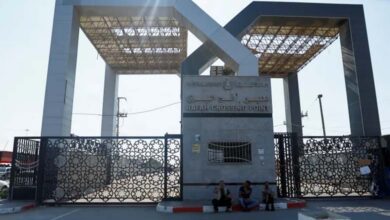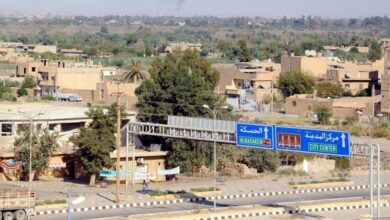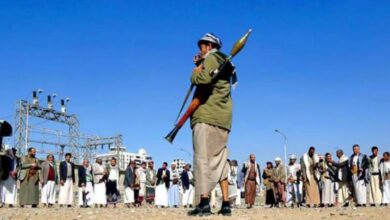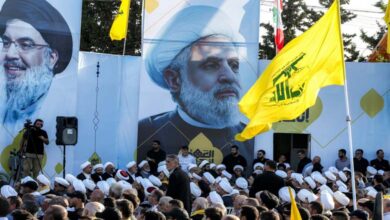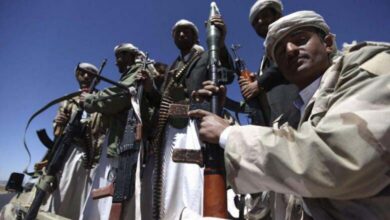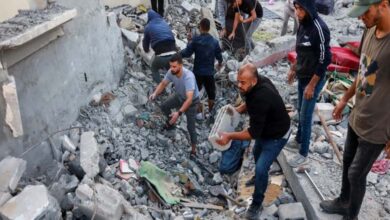Houthi Militants Escalate Attacks against Israel in a Message of Intimidation to Their Interior
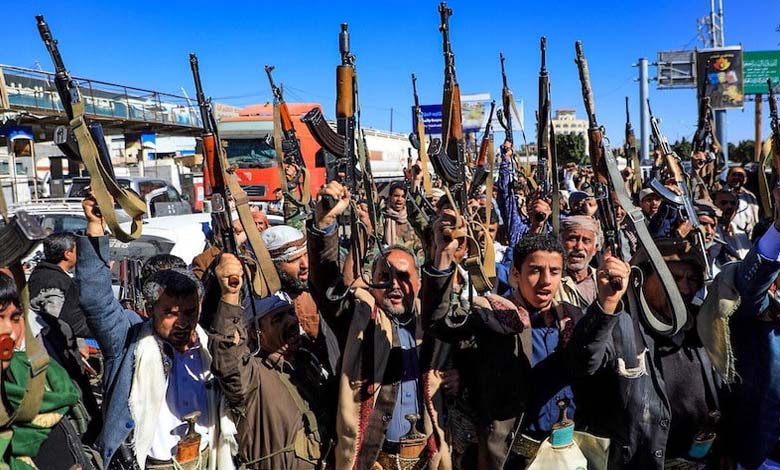
The Houthis believe that halting their attacks, following the retreat of their regional allies, could be seen as a sign of weakness, which may encourage their enemies to act against them internally.
The Yemeni Houthi group insists on continuing its attacks against Israel, despite the setbacks suffered by what is known as the “Resistance Axis,” especially after the fall of Bashar al-Assad’s regime, the loss of Iran’s influence in Syria, and the heavy strikes sustained by Hezbollah.
-
“The Bells of Damascus” Alarm the Houthis: Yemeni Calls Intensify to “Uproot the Militias”
-
Using an Iranian drone… a horrific massacre committed by the Houthis in Taiz
According to two experts, this insistence aims to send an internal message confirming their resilience and their ability to endure, despite the decline of their regional allies. Stopping these attacks could be interpreted as a sign of weakness, encouraging their opponents to mobilize against them internally.
The rebels in Yemen are aware that their real threat lies in an internal ground battle, not in external airstrikes, which they have become adept at minimizing thanks to their long military experience.
-
The Houthis escalate hostility towards Israel as the West responds with harsh strikes: What’s the story?
-
The Houthis are preparing to leave Hodeidah… What are they doing?
In solidarity with Gaza, amid the ongoing Israeli genocide against the Gaza Strip since October 7, 2023, which has so far led to the deaths and injuries of more than 152,000 Palestinians, the Houthi group began, in November 2023, targeting Israeli or linked cargo ships in the Red Sea with missiles and drones.
In response to these attacks, Washington and London have been launching airstrikes and missile attacks on “Houthi sites” in Yemen since the beginning of this year. The Houthi group responded by declaring that all U.S. and British ships are now considered military targets, and expanded its attacks to ships passing through the Arabian Sea and the Indian Ocean, or any place reachable by its weapons.
-
A New Deal between the Houthis and Al-Qaeda… Details
-
What Are the Risks of Increasing Cooperation between the Houthis and Somalia’s al-Shabaab? Observers Respond
Additionally, the Houthi group periodically launches missile and drone attacks on Israel, some of which targeted Tel Aviv, demanding the end of the Israeli genocide in Gaza in exchange for stopping their attacks.
The latest operation, on Monday evening, saw the group attack a military target in the Jaffa area of central Israel with a “Palestine 2” hypersonic ballistic missile.
At the same time, Israeli emergency services reported that five people were injured while rushing to shelters in Tel Aviv and other areas of central Israel due to the missile launched from Yemen.
-
Due to the Brotherhood and the Houthis… Disasters and Tragedies on the Roads of Taiz
-
Following in Daesh’s Footsteps… The Houthis Spoil Yemeni Celebrations
Explaining the Houthis‘ insistence on continuing their attacks on Israel despite the setbacks suffered by the “Resistance Axis,” Yemeni political expert Ahmed Naji, a senior researcher at “International Crisis Group,” explained that the group aims to send two essential messages.
The first message is that the Israeli genocide in Gaza is still ongoing, and the Houthis consider their commitment to support Gaza an obligation they cannot retreat from, no matter the cost. The second message is to confirm their resilience and strength despite the blows and setbacks suffered by their allies, Iran, Hezbollah, and the Syrian regime.
-
The Houthis’ Catastrophe Enters Its Second Decade: A Fireball Burning Yemen
-
Sinwar and the Houthis: An Alliance in a “Battle of Attrition and Existence”
Naji added that the Houthi group, in their ongoing military operations, asserts that they will not retreat. “We are flexible, but regression is not an option; we remain strong and capable, and what happened to Iran, Hezbollah, and al-Assad‘s regime does not concern us, we are always an exception.”
In agreement with this, Yemeni political analyst Abdel Salam Qaed sees the Houthis‘ continued attacks on Israel at this time as an attempt to prove that they are still a solid force, indifferent to the strikes that have weakened their allies in the “Resistance Axis.”
-
The Brotherhood Strengthens Its Relationship with the Houthis… What’s New?
-
The Houthis and Somali al- Shabaab: “The Devil’s Alliance” Reaches the Horn of Africa
He added that these attacks aim to counter calls for their internal elimination and the recovery of the state in areas under their control. According to him, the continuation of operations demonstrates their power and boosts the morale of their fighters, as stopping the attacks could reflect weakness or fear of a fate similar to that of Bashar al-Assad’s regime, encouraging their enemies to attack them.
This is why, according to Qaed, the Houthis feel reassured by the ineffectiveness of Israeli and American airstrikes, which often target empty sites, while their leaders constantly move to avoid targeting, thereby reducing any significant losses, whether in Yemen or the Red Sea.
-
In a surprising decision, the Houthis threaten to target Saudi Arabia
-
Reopening roads reveals the false battles of the Houthis and the Brotherhood… Details
Finally, Qaed emphasized that the group’s leadership, supported by Tehran and strengthened by its experience, is accustomed to minimizing the impacts of airstrikes, and their real danger comes from an internal ground battle that could arise within Yemen, not external strikes.
The Houthis try to convince that any war against them internally is, in fact, a “collaboration with the Israeli occupation,” in order to recruit more fighters under the pretext of confronting the Israeli state. This tactic allows them to shift the battle’s context from local to global, demonizing their internal adversaries.
-
“Support for Gaza”: The Houthis’ Pretext for Turning Sanaa Mosques into Recruitment and Mobilization Centers
-
Washington Warns of Tehran’s Attempts to “Hide Behind the Houthis”


